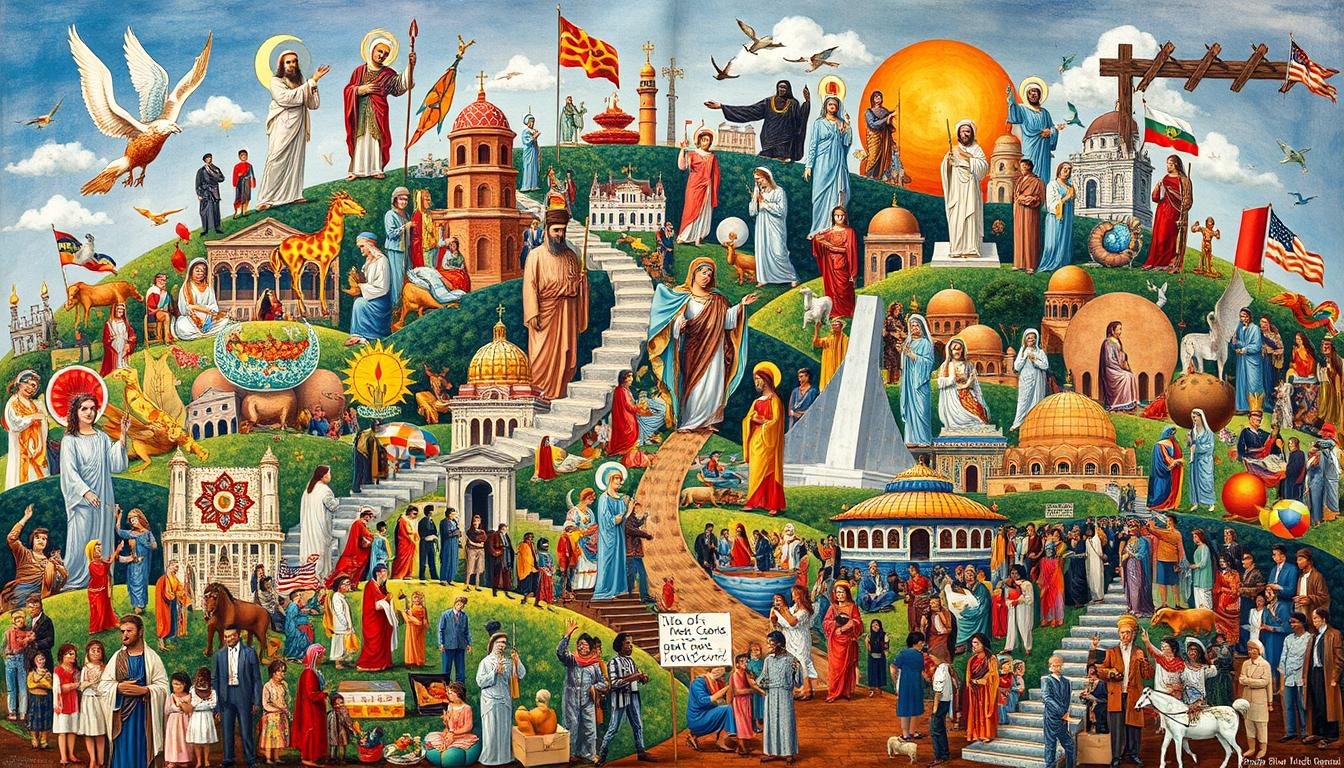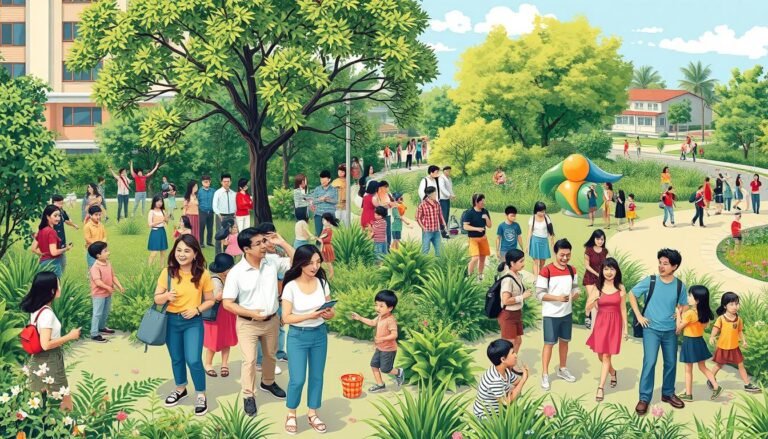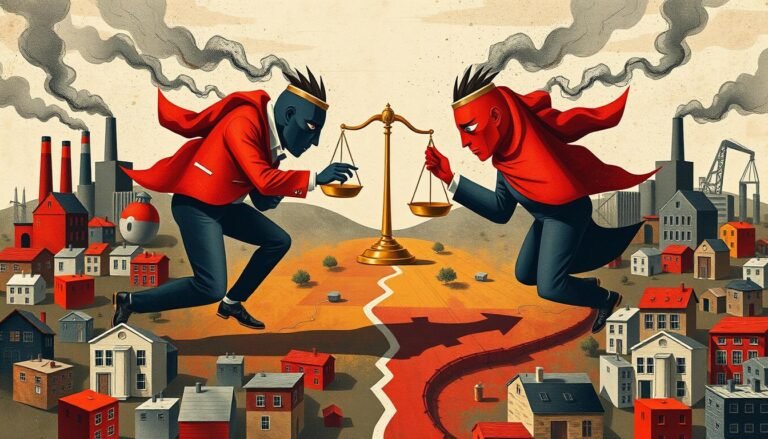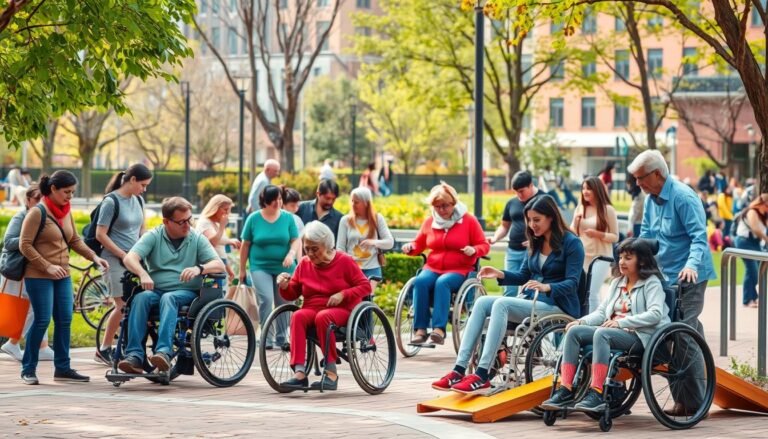The Role of Religion in Society: A Sociological Perspective
Ever thought about how religion affects our world beyond our personal beliefs? Sociologists are deeply interested in this topic. They see religion as a key factor in shaping our culture and social structures.
For sociologists, religion is more than personal beliefs. It’s a strong force that shapes social norms, guides actions, and affects the economy. This view helps us see how faith and society interact in complex ways.
Émile Durkheim, a leading figure in sociology, defined religion as “a unified system of beliefs and practices relative to sacred things.” He believed religion acts as a social bond, bringing people together and offering comfort in tough times.
Max Weber, another key sociologist, saw religion as a force for change. He linked Protestant beliefs to the growth of capitalism, showing how religious ideas can influence economic systems.
These views highlight the deep impact of religion on society. From rituals that unite communities to beliefs that fuel social movements, religion plays a complex and intriguing role in our lives.
Key Takeaways
- Religion is a major social institution influencing cultural values
- Sociological perspectives offer unique insights into religion’s societal role
- Émile Durkheim viewed religion as a source of social cohesion
- Max Weber linked religious beliefs to economic development
- Religion shapes norms, behaviors, and even economic systems
- Sociologists study religion’s impact on both individual and collective levels
Understanding Religion from a Sociological Standpoint
Sociologists look into religion to learn about social structures and human actions. This view helps us see how faith traditions shape both societies and individuals. Let’s dive into how sociologists define and study religion.
Defining Religion in Sociological Terms
In sociology, religion is viewed as a set of beliefs, practices, and symbols. It deals with life’s big questions. It’s not just about personal faith but how it affects communities and cultures. This view lets researchers study religious diversity in various societies.
The Importance of Studying Religion in Society
Looking at religion sociologically shows its big impact on social norms and actions. Studies find that religious people tend to be happier and more satisfied with life. For instance, being religious might lead to better health, with these individuals living longer.
Key Sociological Theories on Religion
Sociological theories give us different ways to see religion’s role in society. Functionalism views religion as a way to bring people together. Conflict theory looks at how power works in religious groups. Symbolic interactionism explores how people see and use religious symbols and rituals in everyday life.
| Theory | Main Focus |
|---|---|
| Functionalism | Social cohesion and stability |
| Conflict Theory | Power dynamics and inequalities |
| Symbolic Interactionism | Individual interpretation of religious symbols |
These theories help us grasp the complex links between religion, society, and beliefs. By looking at faith through these views, researchers can find important insights into human actions and social structures.
The Functionalist Perspective on Religion
Functionalism sees religion as key to society, keeping social order and stability. Sociologist Émile Durkheim shaped this view. He saw religious beliefs as crucial for community unity and giving life meaning.
Religion as a Source of Social Cohesion
Religion brings people together with common beliefs and rituals. It makes everyone feel they belong and strengthens community ties. Through religious events, people connect, making their community stronger and more united.
Religion’s Role in Providing Meaning and Purpose
Religious beliefs help people understand life’s big questions and find purpose. They offer comfort in hard times and help with uncertainty. By explaining mysteries and guiding morals, religion gives a direction and meaning to life.
The Stabilizing Effect of Religion on Society
Functionalists believe religion helps keep society stable by sharing values. It acts as a social control, pushing for good behavior and stopping disruptive actions. Religious places teach kids the norms and values of their society.
| Function | Description | Impact on Society |
|---|---|---|
| Social Cohesion | Unites people through shared beliefs and practices | Strengthens community bonds |
| Meaning and Purpose | Provides answers to existential questions | Enhances individual well-being |
| Social Stability | Promotes shared values and norms | Maintains social order |
Conflict Theory and Religion in Society
Conflict theory looks closely at how religion affects society. It’s based on Karl Marx’s ideas, seeing religion as a way to keep social inequality going and cause religious fights. This view questions the idea that religion only brings people together, showing it can also tear them apart.
Religious groups often mirror and support the power structures already in place. For example, some faiths don’t let women lead. A 2013 study showed that Islamic and Hindu countries had the most gender inequality. Even in the U.S., where women are often more religious, only 20% of church leaders are women.
Religion also shapes cultural values, keeping social hierarchies in place. The Southern Baptist Convention in 1998 said wives should “submit graciously” to their husbands. This shows how religious beliefs can keep traditional gender roles strong.
“Religion is the opium of the people.” – Karl Marx
This famous saying means religion can make people happy with their lot in life, stopping them from fighting against social unfairness. Critics say this view misses the good things about faith and its power to spark social change.
Religious differences have caused many wars over the years. In the 20th century, 24 wars had a religious side to them. From the Crusades to today’s fights in the Holy Land, religion has often been a reason for conflict and violence.
While conflict theory gives us important insights, we must see that religion’s role is complex. It can bring people together or drive them apart, comfort or oppress, based on how it’s seen and used in different social settings.
Symbolic Interactionism and Religious Experiences
Symbolic interactionism helps us see how people find meaning in religion. It looks at how symbols and social interactions shape our faith.
The Importance of Religious Symbols and Rituals
Religious symbols are key to our beliefs and actions. Things like crosses and sacred texts mean a lot to believers. They help express faith and bring people together.
Rituals like prayers and ceremonies are vital too. They’re symbolic acts that strengthen beliefs and community ties. For instance, praying together can make people feel closer.
Individual Interpretation and Practice of Faith
Symbolic interactionism says people make their own sense of religious teachings. They use social interactions to give symbols and concepts their own meanings. This shapes their spirituality and how they live their faith.
Impact on Daily Life and Personal Identity
Religion plays a big role in who we are. Being part of a faith community gives people a sense of belonging. This connection guides their choices and actions in life.
- Religious beliefs shape social interactions
- Faith practices impact personal values and behavior
- Spiritual experiences contribute to self-understanding
Looking at religion through symbolic interactionism shows us how faith affects us and society.
The Role of Religion in Society: A Sociological Perspective
Religion is a big part of our society. It shapes our social life and brings people together. Sociologists look into how it affects our actions and how we interact with others.
Functionalists see religion as a key part of society. It helps keep things stable by teaching us right from wrong. It also helps us feel like we belong through shared beliefs and rituals.
Here are some ways religion helps society:
- Social cohesion
- Emotional support
- Socialization
- Cultural integration
When things get tough, religion gives us hope and comfort. It shapes our values and how we act, especially when we’re young. In diverse places, it can help different groups get along.
“Religion is the sigh of the oppressed creature, the heart of a heartless world, and the soul of soulless conditions.” – Karl Marx
Some say religion can make things worse by keeping some people down. They point out that not everyone gets the same benefits from religion, no matter their social status. This view questions the idea that religion always helps society.
| Aspect | Positive Impact | Potential Challenges |
|---|---|---|
| Social Cohesion | Brings people together | May exclude non-believers |
| Moral Guidance | Provides ethical framework | Can be used to justify discrimination |
| Cultural Identity | Preserves traditions | May resist social change |
Looking at religion’s role in society is complex. Sociologists keep studying how it influences and is influenced by our social world. This helps us understand human behavior and how we interact with each other.
Religion as an Agent of Social Control
Religion is a big part of how we live together. It helps shape what we see as right and wrong. It guides our choices and affects our values.
Religious groups help keep society in order. They bring people together and make us feel like we belong.
Moral Guidance and Behavioral Norms
Religious teachings give us a set of rules for living. They tell us what is good and bad. For instance, many faiths teach us to be honest, kind, and respectful.
Religious Institutions and Social Order
Churches and mosques are key parts of our communities. They make us feel connected and stable. Going to services helps us bond with others and share our beliefs.
These places also offer support in big life changes, like when we’re born or when we die.
The Influence of Religion on Law and Policy
Religion doesn’t just affect our personal lives. It also shapes laws and social rules. In the U.S., religion is still a big deal in public life.
| Aspect | Religious Influence |
|---|---|
| Prayer | 75% of Americans pray weekly |
| Service Attendance | Over 50% attend monthly |
| Economic Impact | Protestant work ethic linked to capitalism |
Even though some people are moving away from religion, it’s still a big deal in our lives. It affects laws, policies, and how we act. Its role in society is still strong today.
Religion and Social Change
Religion has a complex role in social change. It has both pushed for progress and fought against change throughout history. The way religious movements and society change shows how complex this relationship is.
Religious beliefs have led to big social movements. The civil rights movement, led by Martin Luther King Jr., was powered by Christian teachings. Liberation theology in Latin America fought for economic justice. Sikhism was early in supporting women’s rights, challenging old gender norms.
Economic factors often work with religious beliefs to drive social change. Max Weber linked Protestantism to the rise of capitalism. He said that Calvinism’s idea of predestination made people work hard to show they were chosen, which helped start capitalism.
| Religion’s Role | Example | Impact |
|---|---|---|
| Catalyst for Change | Civil Rights Movement | Racial Equality |
| Economic Influence | Calvinism | Capitalist Work Ethic |
| Social Norms | Sikhism | Women’s Rights |
But, religion’s role in social change isn’t always simple. Some faiths resist change, wanting to keep old ways. The drop in going to church shows a change in how religious ideas spread. This could affect future social movements and their religious roots.
The Impact of Religion on Cultural Values
Religion deeply shapes cultural values in societies. It changes how people see the world, interact, and decide. Let’s look at how religious beliefs affect social life.
Shaping Societal Norms and Expectations
Religious teachings set standards for behavior and morality. These norms become part of society, guiding actions and choices. For instance, many religions teach honesty, compassion, and respect for others. These values shape social interactions and what people expect from each other in communities.
Influence on Family Structures and Gender Roles
Religious beliefs greatly affect family life and gender roles. Some faiths support traditional family setups, while others welcome diverse family forms. Religious teachings also shape gender roles in society, outlining men’s and women’s roles in family and community.
Religion’s Role in Education and Socialization
Many social institutions, like schools, are shaped by religious values. Religion influences educational curricula and teaching methods. It also helps pass on cultural values from one generation to the next through socialization.
| Aspect | Impact of Religion |
|---|---|
| Social Norms | Guides ethical behavior and moral standards |
| Family Structure | Influences family roles and relationships |
| Education | Shapes curriculum and teaching approaches |
| Gender Roles | Defines expectations for men and women |
Understanding how religion affects cultural values is key in our diverse world. It helps us value different perspectives and respect various faith traditions and cultural backgrounds.
Religious Diversity and Social Cohesion
Religious diversity is key to building strong communities. In today’s world, many faiths live together, bringing both good and bad. It’s vital to see how religious differences affect us to make communities that welcome everyone.
FBOs play a big part in bringing people together and fighting for justice. They teach values like kindness that go beyond just one religion. For example, Focus Hope in Detroit fights racism and helps minority groups, showing how faith groups can make a big difference.
Studies by Pant, Kirsch, and Subbarao show how important FBOs are in helping society. Since 2001, the government has backed these groups through the White House Office of Faith-Based and Community Initiatives. This shows how faith groups help keep society together.
| Contributions of Faith Communities | Impact on Social Cohesion |
|---|---|
| Religious rituals and traditions | Create unity and foster community |
| Altruistic values promotion | Encourage compassion and kindness |
| Philanthropic activities | Provide aid to those in need |
| Interfaith dialogue | Promote understanding between different faith traditions |
Having different religions can cause problems, but it also brings chances for growth and learning. By accepting various faiths and talking across faith lines, we can make communities that are more united and proud of their diverse backgrounds.
Secularization and the Changing Role of Religion
Religious beliefs are changing in today’s world. Secularization means religion is losing its power. This change is affecting personal spirituality and how religion fits into public life.
Trends in religious affiliation and practice
How people connect with religion is changing. In the 1920s, almost all young Americans saw Christianity as the only true faith. By the late 1970s, this number fell to 41%. This shows people’s views on faith are changing.
Steve Bruce’s idea of rationalization explains why. People now look for logical reasons for events, not divine ones.
The rise of spiritual but not religious individuals
Many now call themselves “spiritual but not religious.” This shows a move towards finding personal meaning outside traditional religious groups. It’s a shift towards individual spirituality away from organized religion.
This change shows how people are now engaging with faith differently in their daily lives.
Religion in the public sphere
Religion’s role in public life is also changing. Talcott Parsons’ idea of structural differentiation explains this. Roles once filled by religion are now taken by other groups.
For example, education and health services, once run by religious groups, are now mostly state-run. This change affects how religion interacts with society.
Source Links
- Chapter 15. Religion
- 15.1 The Sociological Approach to Religion – Introduction to Sociology 3e | OpenStax
- Sociological Perspectives on Religion
- 17.3 Sociological Perspectives on Religion
- Functionalist Views on the Role of Religion
- The Functionalist View of Religion in Sociology
- Reading: Theoretical Perspectives on Religion
- 13.7 Sociological Perspectives on Religion – Exploring Our Social World: The Story of Us
- The Symbolic Interactionist View of Religion in Sociology
- Theoretical Perspectives on Religion | Introduction to Sociology
- The Sociological Approach to Religion – Intro to Sociology Study Guide 2024 | Fiveable
- A Sociological Perspective on Religion
- Religion as a Social Institution
- Religion and Social Change – Unit 3
- 8.3 Making Sense of Religion
- Sociological Views on Religion | Introduction to Sociology
- Religion as a Force for Social Cohesion and well-being: Establishing a Correlation Between…
- Social Cohesion and Religious Diversity
- a sociological perspective on the future of religion
- Secularization: the fate of faith in modern society
- Secularisation – Sociological Perspective: Explained







